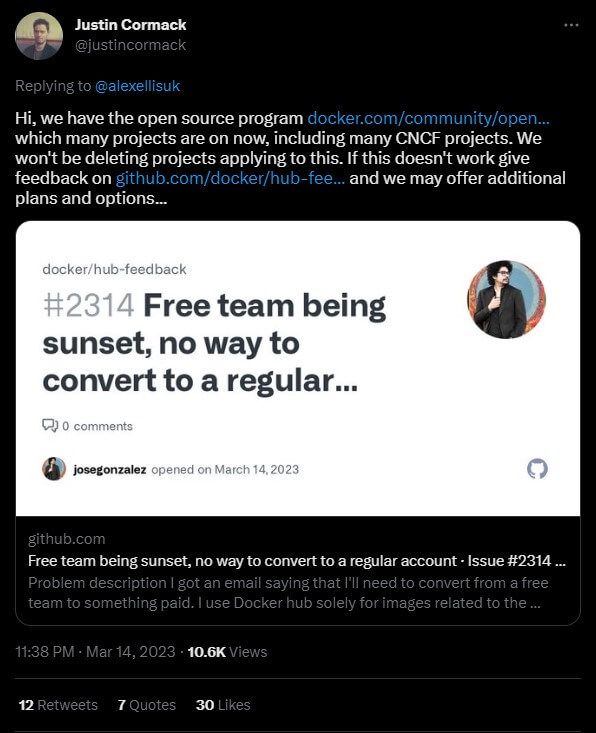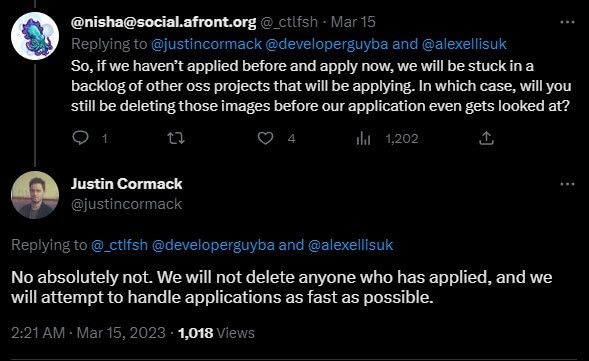
Docker is a popular containerization service offering various services to deliver software efficiently.
But, in recent times, the folks behind it have been pulling some moves that may not be friendly to the open-source ecosystem as a whole.
- Public images will only disappear if the maintainer of the image decides to delete it.
- Assigned more staff to review applications for its program to help open-source projects.
- You can migrate from a Free Team organization to a Personal user account.
- This change does NOT affect subscriptions such as Docker Personal, Docker Pro, Docker Team (paid), or Docker Business.
And the recent move by them is no different. Kudos to a blog post by Alex Ellis for bringing this to our attention.
Let me guide you through this potentially disruptive move by Docker.
What happened?: Recently, they sent emails to Docker Hub users with an existing organization saying:
'Free Team organizations are a legacy subscription tier that no longer exists,' 😲
And their accounts will be deleted after a 30-day retention period if they don't opt for a paid team plan. Alex also shared a screenshot of the message he received via email:
Is Docker saying that the OSS openfaas organisation on Docker Hub will get deleted if we don't sign up for a paid plan?
— Alex Ellis (@alexellisuk) March 14, 2023
What about Prometheus, and all the other numerous OSS orgs on the Docker Hub?
cc @justincormack pic.twitter.com/FUCZPxHz1x
Well, can you see how this is a bad thing?
This can potentially affect most open-source projects that use Docker to host their images.
Open-source projects usually don't have much funding and are usually either small projects run individually or by a handful of people, mostly self-funded. While Docker has a provision for such projects under their open-source program, it is not much of help.
There are reports by many users that they take a very long time to process such requests, with waiting periods of more than a year.
That does not sound promising at all 😑
Now, the only other ways for people to save their open-source projects are either to pay up or to migrate somewhere else before the impending purge.
A tweet reply on this matter by Justin Cormack, the CTO of Docker, doesn't instill much confidence:

Are they handling this poorly?: Yes. The wording in the announcement notice that they sent out is pretty bleak-looking.
They don't mention whether private repos or public repos will be the ones to be affected or both.
Then there is the risk of cyber-squatting that may arise after deletion, where bad actors pose as the deleted projects and push so-called 'poison images' with malicious code.
Justin does add that; they won't delete any projects that have applied and are handling applications as fast as possible.

But I wonder what will happen to the ones who haven't. My best guess currently is complete deletion after the 30-day retention period.
⭐ Solution for now: If you want to avoid opting for a paid plan, either migrate to GitHub's Container Registry (or anything similar) or manually migrate your images.
Furthermore, I suggest you go through Alex's blog to learn about the Docker Hub alternatives and how it will impact his project 'OpenFaaS'.
Docker has been making some weird decisions lately.
Take, for instance, the rate-limiting fiasco of 2020, Which introduced a rate limit to Docker Hub. It was not well received due to its apparent issues.
And fast forward to 2023, sunsetting the free team plans...
What do you think? Share your thoughts in the comments.
- Even the biggest players in the Linux world don't care about desktop Linux users. We do.
- We don't put informational content behind paywall. Your support keeps it open for everyone. Think of it like 'pay it forward'.
- Don't like ads? With the Plus membership, you get an ad-free reading experience.
- When millions of AI-generated content is being published daily, you read and learn from real human Linux users.
- It costs just $2 a month, less than the cost of your favorite burger.
Become a Plus Member today and join over 300 people in supporting our work.









